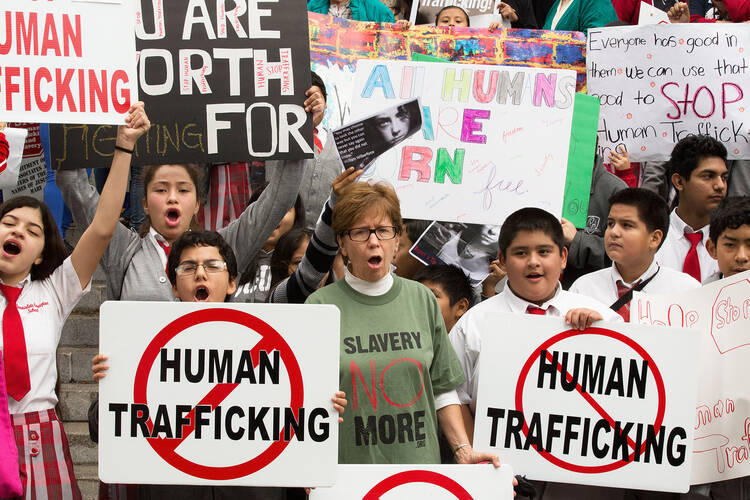At a conference sponsored by the Holy See Mission to the United Nations, the message was clear: ending human trafficking and all forms of modern slavery is within global reach, but the complete abolition of these contemporary scourges remains frustrated by a lack of leadership, cross-border coordination and the commitment of global resources adequate to the task.
Many of the panelists at “Ending Human Trafficking by 2030: The Role of Global Partnerships in Eradicating Modern Slavery,” convened at the United Nations in New York on April7, complimented the Holy See on the leadership the church has shown on combatting human trafficking and slavery. The church is engaged against trafficking and modern slavery from the street level where Catholic sisters, for example, work with London police to rescue women enthralled by prostitution, all the way to top policymaking tiers—diplomats from the Holy See have consistently pressed the issue at the United Nations. The United Nations was criticized by several panelists for not taking a stronger leadership role in eradicating all vestiges of the trafficking and modern slavery.
Cardinal Vincent Nichols of Westminster, England, represented the church’s Santa Marta initiative, an alliance of international police chiefs and bishops from around the world working together with civil society to eradicate human trafficking and modern day slavery. It was launched in 2014 and named for the pope's residence, where participants in the initial conference stayed. "The core proposal of this day is that [the goal of eradicating modern slavery by 2030] cannot be achieved without effective, international cooperation at many levels,” Cardinal Nichols said.
"That there are over 20 million people callously held in modern slavery in our world today is a mark of deep shame on the face of our human family," he added, imploring the beginning of that effective cooperation.
Slavery and human trafficking generate some $150 billion dollars a year in illegal profits—by some estimates it is the world’s second largest criminal enterprise after drug trafficking—yet spending on anti-slavery development systems came to just 0.08 percent of that amount by nations in the Organization for Economic Co-operation and Development (OECD). That’s according to Kevin Hyland, the United Kingdom’s first ever Independent Anti-Slavery Commissioner.
He added that a mere 0.2 percent of slavery cases are investigated and prosecuted each year. “The sad and simple truth is that the anti-slavery movement has so far failed," Hyland said. While he is aware of thousands of security officers around the world devoted to anti-terrorism—“properly so”—and thousands more devoted to drug interdiction, “which is absolutely right,” Hyland reports that only a few hundred officers in the United Kingdom have been made available to combat human trafficking and modern slavery. “Yet if we compare these three crimes, which one ruins, destroys and takes more lives on a daily basis?”
Criminals have noticed the lack of police attention, he adds. Hyland reports that he was aware of some international criminals who have actually made the switch from drug to human trafficking because they came to view it “as a low-risk and high return crime.”
Modern slavery is practiced in every nation of the world, panelists said, in a variety of industries. Women and children entrapped in sex work and prostitution is one of the better known forms of human trafficking and modern slavery, but victims can be found in many other global industries, particularly in agriculture, food production and mining. While human bondage may seem an affront from another age, in the contemporary economy slaves are hidden deep in food or manufacturing supply chains. Shrimp peeled by child slaves in Thailand may land on Western dinner tables tonight, while mobile phones that have become an ubiquitous presence may rely on conflict minerals mined by slave labor.
Pope Francis has persistently drawn attention to the problem, many panelists noted. “When we were working on [identifying] the sustainable development goals, you would not believe how difficult it was to get this key issue on board,” remembered Macharia Kamau, Kenya’s ambassador to the United Nations. The U.N.’s sustainable development goals, or SDGs as they are known, are targets detailed in a comprehensive global plan for eliminating poverty and responding to the global climate change crisis by 2030. Among them SDG 8.7 calls for the eradication of modern slavery by 2030, but “it took the direct intervention of the pope himself,” Kamau said, to get that ambition included.
Kamau offered one of the more memorable reflections of the evening, wearily noting that modern slavery will not end if the global community did not do more—practically—on climate change, development and unemployment—and morally—confronting societal racism and misogyny. Slavery, he said, was a global institution deeply rooted in human history and the human heart.
He pointed out that “8.7 is just a target and all the legislation and all the good will in the world will not mean anything if we don’t have a change of heart in the way we human beings treat each other.” If global leaders did not take responsibility for fundamental structural changes to respond to climate change and vast social disparities which dislodge and immiserate the world's poor, “it is inconceivable that people will not be carted off into modern slavery.”
"If the fundamentals don’t change nothing will change,” Kamau said. “It is my sincere hope that his holiness will continue to focus on this issue in his way…[emphasizing] that this issue goes beyond [responding to slavery] to how we human beings treat each other, embrace each other and ultimately give each other the space to live on this earth as human beings.”








